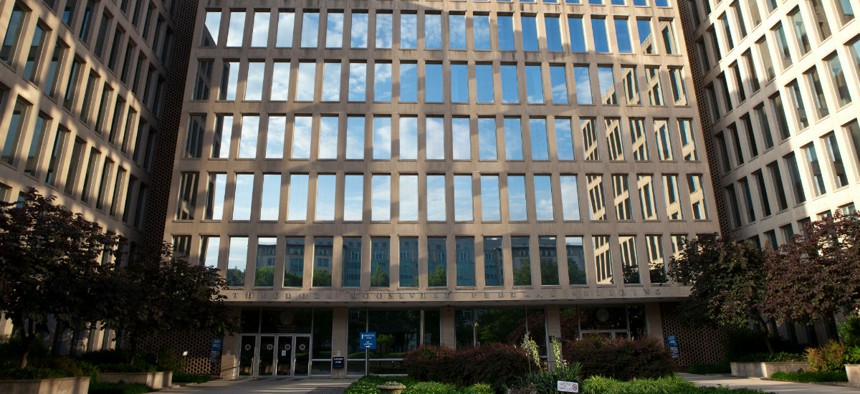Judge Says Government Faces ‘Uphill Battle’ to Prove OPM Hack Victims Don’t Have Standing to Sue
Unions seek to reverse lower court's dismissal of their pursuit for lifetime protections.
The federal government was once again forced to defend itself against accusations of negligence and “reckless indifference” in allowing the personal information of millions of federal employees and other individuals to be hacked in 2015, with a federal court on Friday hearing oral arguments in an appeal of an ongoing lawsuit on the matter.
Two federal employee unions brought their suit to the U.S. Court of Appeals for the D.C. Circuit after a district court dismissed the case last year for lack of standing. The American Federation of Government Employees and the National Treasury Employees Union are seeking lifetime credit monitoring and identity theft protection for affected individuals, and NTEU is also aiming to change the way the Office of Personnel Management stores and protects personnel data. OPM disclosed two data breaches in 2015, one that exposed the personnel files of all current and former federal employees and another that released the personally identifiable information of all applicants for security clearances, as well as their families.
A panel of three judges heard oral arguments on Friday, with AFGE and NTEU representatives presenting their cases separately. At least two of the judges—Patricia Millett, appointed by President Obama, and David Tatel, appointed by President Clinton—noted that plaintiffs incurred real costs as a result of the breach and may face legitimate risks beyond the 10 years for which the government is currently offering protections.
Much of the discussion surrounded one plaintiff who bought her own identity theft protection outside of what the government offered. The government argued that purchase does not constitute damages because she bought only what OPM was already offering her for free. Millett suggested that it was not a “self-inflicted” cost if the plaintiff “reasonably believes” the government offer was insufficient. She added that could be a legitimate concern “given the government’s screw up,” quickly correcting herself that the “screw up” was only an allegation.
Attorneys for NTEU and AFGE repeatedly noted that OPM had ignored warning signs, including from its own inspector general, that it was not properly protecting its data and was therefore “willfully and intentionally” failing in its duties. NTEU said its clients had a constitutional right to informational privacy and the government violated that right. AFGE is seeking a remedy under the 1974 Privacy Act.
A government attorney said even if there is proven negligence, the Privacy Act would not justify the remedies the union is seeking. As to NTEU’s claim, the attorney said the plaintiffs failed to demonstrate the relief they are seeking would redress their damages.
“The standing argument fails based on redressability,” the attorney said.
Union attorneys argued that their members have already had to deal with issues of stolen identity, and it is plausible to suggest it stemmed from the OPM data breach. Even plaintiffs who have not spent money on the issue have dedicated time, they said, which constitutes damages.
“I’m only speaking for one member of the panel but you’ve got an uphill battle,” Judge Tatel told a government attorney, speaking specifically on the second case brought by NTEU. He also suggested that if the plaintiffs are found to have standing in one case, it is likely to apply to the other.
AFGE’s suit also named KeyPoint Government Solutions, a contractor that handled background checks on behalf of the government, as a defendant. An attorney for the company said it was immune from any liability, as it was simply following the direction of the government. The judges questioned whether precedent actually exculpated the contractor, as in this case KeyPoint was not following a specific government instruction.
At the district court level, Judge Amy Jackson said in dismissing the case that there was no evidence the breached information ever made it into the hands of cyber criminals who might use it to commit tax fraud, apply for phony credit cards or steal a victim’s identity—the sort of damage that might give the plaintiffs standing to sue. A person’s data being taken does not itself give standing to sue, Jackson said, and the plaintiffs failed to demonstrate actual harm or “impending” or “substantial” risk.
Congress intervened to give hack victims 10 years of protections in a fiscal 2016 spending bill. OPM offered the 21.5 million federal employees, contractors, applicants and family members affected by the breach involving security clearance files three years of a “suite of services,” including full service identity restoration support and victim recovery assistance, identity theft insurance, identity monitoring for minor children, continued credit monitoring and fraud monitoring services beyond credit files. The 4.2 million current and former federal workers affected by the initial hack of personnel data—most of whom were also impacted by the second breach—were offered just 18 months of credit monitoring and identity theft insurance.
After the hearing, Paras Shah, an NTEU attorney, said there was no timetable for when the judges would issue a ruling. If the appeals court finds the plaintiffs have standing, it would likely send the case back to the district level for a ruling on the merits of the case.
NEXT STORY: The One Surefire Way to Make Your Voice Heard




